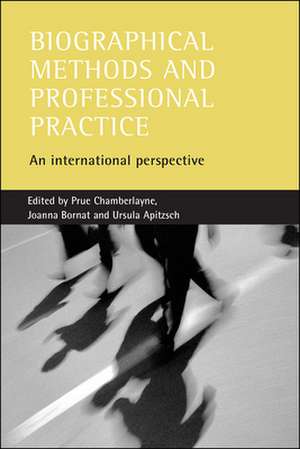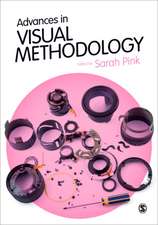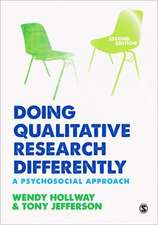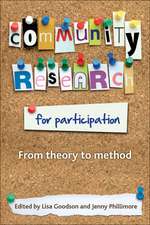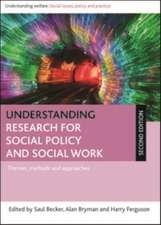Biographical methods and professional practice – A n international perspective
Autor Prue Chamberlayneen Limba Engleză Paperback – 9 mar 2004
The turn to biographical methods in social science is yielding a rich harvest of research outcomes and invigorating the relationship between policy and practice. This book uses a range of interpretive approaches to reveal the dynamics of service users' and professionals' individual experiences and life-worlds. It shows how biographical methods can improve theoretical understanding of professional practice, as well as enrich the learning and development or professionals, and promote more meaningful and creative practitioner-service user relationships.Biographical methods and professional practice:reviews applications of biographical methods in both policy and practice in a range of professional contexts, from health and social care to education and employment;explores the impact on proffesional practice of social change in three main arenas: transformation from Eastern to Western types of society in Europe, major shifts in social and welfare principles, experiences of immigration and of new cultural diversity;critically evaluates subjective and reflexive processes in interactions between researchers, practitioners and users of services;considers the institutional arrangements and cultural contexts which supporteffective and sensitive interventions and which support and encourage change in the lives of individuals.With contributions from leading international experts, it provides a valuable comparative perspective. Researchers, policy analysts and practitioners, postgraduate students, teachers and trainers will find this book a stimulating read.
Preț: 361.90 lei
Nou
Puncte Express: 543
Preț estimativ în valută:
69.25€ • 75.53$ • 58.39£
69.25€ • 75.53$ • 58.39£
Carte disponibilă
Livrare economică 03-17 aprilie
Preluare comenzi: 021 569.72.76
Specificații
ISBN-13: 9781861344922
ISBN-10: 1861344929
Pagini: 352
Dimensiuni: 157 x 235 x 22 mm
Greutate: 0.54 kg
Ediția:New.
Editura: Bristol University Press
ISBN-10: 1861344929
Pagini: 352
Dimensiuni: 157 x 235 x 22 mm
Greutate: 0.54 kg
Ediția:New.
Editura: Bristol University Press
Recenzii
By now, the 'biographical turn' in the social sciences is widely acknowledged but its impact in the main has been upon academics rather than professional practitioners. Biographical methods and professional practice makes an important and worthwhile contribution by demonstrating that the biographical perspective can be focused fruitfully upon applied, social policy issues both for research and for practice in the field. Robert Miller, Department of Sociology and Social Policy, Queen's University Belfast
... this is a carefully written book that offers well-framed arguments for applying biographical methods to research and practice. ... The book should be kept close at hand and its chapters considered and recognised as situations arise. European Journal of Social Work
... provides a valuable comparative perspective which is a stimulating read.Auto/Biography
The editors have performed a major task drawing together such a rich range of biographically informed research on a variety of professional contexts across differing national contexts ... very useful companion to P. Chamberlayne, M. Rustin and T. Wengraf (eds) (2002), Biography and Exclusion in Europe, Bristol: The Policy Press. Journal of Social Policy
Notă biografică
Prue Chamberlayne, School of Health & Social Welfare, Open University, Joanna Bornat and Ursula Apitzsch, Sociology & Political Science, J.W. Goethe University
Cuprins
Introduction ~ Ursula Apitzsch, Joanna Bornat and Prue Chamberlayne
Part One: Putting the subject into policy and practice: Biographical methods and social policy in European perspective ~ Prue Chamberlayne
Balancing precarious work, entrepreneurship and a new gendered professionalism in migrant self-employment ~ Ursula Apitzsch
Considerations on the biographical embeddedness of ethnic entrepreneurship ~ Maria Kontos
Ethnic entrepreneurship as innovation ~ Feiwel Kupferberg
Part Two: Subjectivity in context: The social subject in biographical interpretive methods: emotional, mute, creative, divided ~ Andrew Cooper
A socially and historically contextualised psychoanalytic perspective: Holocaust survival and suffering ~ Daniel Bar-On
Professional choices between private and state positions in Russia's transformation ~ Victoria Semenova
Maintaining a sense of individual autonomy under conditions of constraint: a study of East German managers ~ Ulrike Nagel
Part Three: Self-awareness in research and practice: Biographical reflections on the problem of changing violent men ~ David Gadd
The biographical turn in health studies ~ Wendy Rickard
Ethical aspects of biographical interviewing and analysis ~ Kaja Kazmierska
Ghost writers: using biographical methods across languages ~ Bogusia Temple
Part Four: Recognising trajectories of disempowerment: 'Bucking and kicking': race, gender and embodied resistance in healthcare ~ Yasmin Gunaratnam
Biography as empowering practice: lessons from research ~ Joanna Bornat and Jan Walmsley
'It's in the way that you use it': biography as a tool in professional social work ~ Riitta Kyllönen
Interpreting the needs of homeless men: interviewing in context ~ Karin Schlücker
Part Five: Biographical resources in education and training: In quest of teachers' professional identity: the life story as a methodological tool ~ Marie-Françoise Chanfrault-Duchet
Narratives, community organisations and pedagogy ~ Rosemary Du Plessis, Jane Higgins and Belinda Mortlock
Doctors on an edge: a cultural psychology of learning and health ~ Linden West
Intercultural perspectives and professional practice in the university: what's new in Germany ~ Lena Inowlocki, Maria Teresa Herrera Vivar and Felicia Herrschaft
Part One: Putting the subject into policy and practice: Biographical methods and social policy in European perspective ~ Prue Chamberlayne
Balancing precarious work, entrepreneurship and a new gendered professionalism in migrant self-employment ~ Ursula Apitzsch
Considerations on the biographical embeddedness of ethnic entrepreneurship ~ Maria Kontos
Ethnic entrepreneurship as innovation ~ Feiwel Kupferberg
Part Two: Subjectivity in context: The social subject in biographical interpretive methods: emotional, mute, creative, divided ~ Andrew Cooper
A socially and historically contextualised psychoanalytic perspective: Holocaust survival and suffering ~ Daniel Bar-On
Professional choices between private and state positions in Russia's transformation ~ Victoria Semenova
Maintaining a sense of individual autonomy under conditions of constraint: a study of East German managers ~ Ulrike Nagel
Part Three: Self-awareness in research and practice: Biographical reflections on the problem of changing violent men ~ David Gadd
The biographical turn in health studies ~ Wendy Rickard
Ethical aspects of biographical interviewing and analysis ~ Kaja Kazmierska
Ghost writers: using biographical methods across languages ~ Bogusia Temple
Part Four: Recognising trajectories of disempowerment: 'Bucking and kicking': race, gender and embodied resistance in healthcare ~ Yasmin Gunaratnam
Biography as empowering practice: lessons from research ~ Joanna Bornat and Jan Walmsley
'It's in the way that you use it': biography as a tool in professional social work ~ Riitta Kyllönen
Interpreting the needs of homeless men: interviewing in context ~ Karin Schlücker
Part Five: Biographical resources in education and training: In quest of teachers' professional identity: the life story as a methodological tool ~ Marie-Françoise Chanfrault-Duchet
Narratives, community organisations and pedagogy ~ Rosemary Du Plessis, Jane Higgins and Belinda Mortlock
Doctors on an edge: a cultural psychology of learning and health ~ Linden West
Intercultural perspectives and professional practice in the university: what's new in Germany ~ Lena Inowlocki, Maria Teresa Herrera Vivar and Felicia Herrschaft
